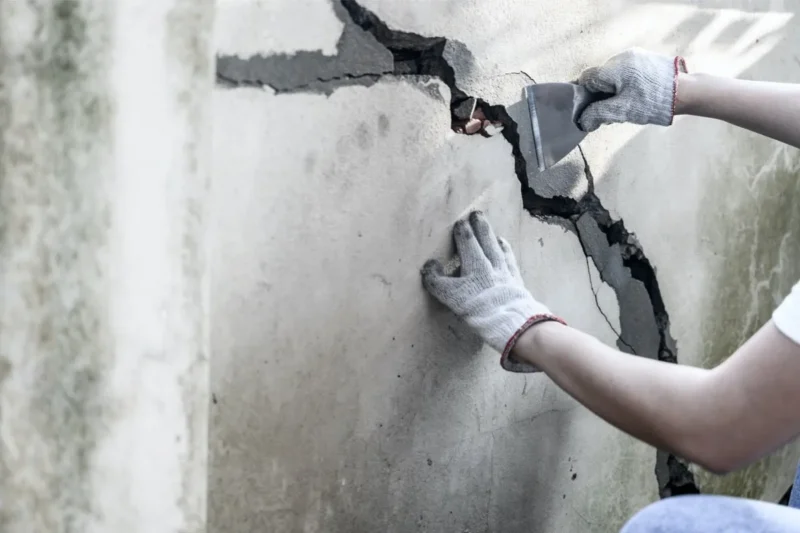Dealing with foundation cracks can be a stressful situation for homeowners. While it is always recommended to seek professional help for major structural issues, minor cracks can often be repaired with some DIY solutions.
By understanding the causes of foundation cracks and taking the right approach to repairs, you can prevent them from worsening and potentially save yourself from costly repairs down the line. In this article, we will explore 4 things to know about DIY solutions for minor foundation crack repairs, providing you with the knowledge and confidence to tackle this common home maintenance issue.
1. Understanding Foundation Cracks: Causes and Types
Some may seem minor but can eventually lead to cracks and structural damage if left unaddressed. Recognizing the different causes and types of cracks can help in assessing the severity of the issue. Minor hairline cracks might indicate settling, which is common in new homes. However, more extensive cracking, such as horizontal or stair-step cracks, could signal significant structural stress. Being proactive about identifying these signs early on can prevent further complications and help maintain the integrity of the property.
Understanding foundation cracks is essential for homeowners to properly address any issues that may arise. These cracks can be caused by a variety of factors such as settlement, moisture, temperature changes, or poor construction.
Different types of cracks can appear in a foundation, including vertical, horizontal, diagonal, or stair-step cracks. It is important to diagnose the root cause of the crack to determine the best course of action for repair.
By understanding the causes and types of foundation cracks, homeowners can better equip themselves to address any minor repairs that may be needed to ensure the stability and integrity of their homes.
2. Tools and Materials Needed for Minor Crack Repairs

To successfully repair minor cracks in your foundation, you will need a few key tools and materials. First, gather a hammer and chisel to chip away any loose concrete around the crack.
Next, you will need a wire brush to clean out the crack and remove any debris. Once the crack is clean, you will need a tube of concrete patch or crack filler to fill in the damaged area.
Additionally, have a trowel on hand for smoothing out the patch and a bucket of water for cleanup. It is also a good idea to wear gloves and safety goggles to protect yourself during the repair process.
Overall, having these tools and materials readily available will make tackling minor foundation crack repairs a simple and manageable task.
3. Step-by-Step Guide to Repairing Minor Foundation Cracks
To repair minor foundation cracks, follow these steps carefully. First, clean the crack with a wire brush and vacuum up any debris.
Next, use a concrete patching compound to fill in the crack, making sure to smooth it out with a trowel. Allow the patch to dry thoroughly before inspecting it for any gaps or imperfections.
If needed, apply a second coat of patching compound and let it dry. Finally, paint over the repaired crack to blend it in with the rest of the foundation.
By following these simple steps, you can easily fix minor cracks in your foundation and prevent any further damage.
4. Tips for Ensuring a Successful DIY Repair

For a successful DIY foundation crack repair, start by thoroughly inspecting the crack to determine its cause and extent. It’s important to address any underlying issues before attempting a repair to prevent future problems.
Next, gather all the necessary tools and materials, including safety gear such as gloves and goggles. Follow the manufacturer’s instructions carefully when using any repair products.
Clean the area around the crack and fill it with an appropriate filler, making sure to work in layers for a durable repair. Allow the repair to dry completely before checking for any additional cracks or leaks.
Finally, monitor the repaired area regularly to ensure the crack does not reappear, and consider seeking professional help if needed. With careful attention to detail and proper technique, you can successfully tackle minor foundation crack repairs on your own.
Conclusion
In conclusion, addressing minor foundation cracks through DIY solutions can help prevent further damage to your home and save you money on costly repairs in the long run. By following the X things to know outlined in this article, you can confidently tackle minor foundation cracks and ensure the structural integrity of your home.
Remember, addressing foundation issues promptly is key to maintaining a safe and stable living environment. If you encounter any challenges or have concerns about the integrity of your foundation, it is always best to consult with a professional for a thorough assessment and repair plan.
Don’t let minor cracks turn into major issues that could lead to a wet basement St Catharines, address them promptly to protect your home and investment.


